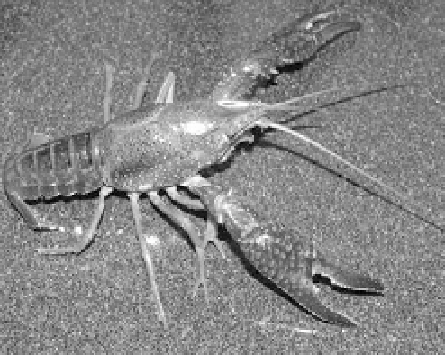Environmental Engineering Reference
In-Depth Information
Mechanical means to move logs to a loading area (landing) produce “skid trails.” Stream crossings are
necessary along some skid trails and most forest road systems and are in especially sensitive areas.
Removal of topsoil, soil compaction, and logging equipment and log skidding can result in long-term
loss of productivity, decreased porosity, decreased soil infiltration, and increased runoff and erosion.
Spills of petroleum products can contaminate soils. Trails, roads, and landings can intercept ground water
flow and cause it to become surface runoff.
10.3.3 Introduction of Exotic Species
Biologically defined disturbance effects occur within species (competition, cannibalism, etc.) and among
species (competition, predation, etc.). These are natural interactions that are important determinants of
population size and community organization in many ecosystems. Biological disturbances due to improper
grazing management or recreational activities are frequently encountered. The introduction of exotic
flora and fauna species can introduce widespread, intense, and continuous stress on native biological
communities.
There are numerous examples worldwide of introduced species bringing about the extinction of native
organisms. The most dramatic have involved predators. An extreme example is the deliberate introduction
of the fish-eating Nile Perch
(Lates nilotica)
to Lake Victoria, in East Africa, causing the extinction of
dozens of species of small endemic cichlid fish. Introduced cats, rats, and snakes have had a similar
effect on island bird fauna (Dugeon and Corlett, 2004).
Exotic animals are a common problem in many areas in the U.S. and China. Species such as
Cambarus
Clarkaij
have been introduced in many waters in south China. Without the normal checks and balances
found in their native habitat in North America and Japan,
Cambarus Clarkaij
reproduces prodigiously
and causes disturbance to the ecosystem. Figure 10.36 shows
Cambarus Clarkaij
. The species burrow in
river levees and have caused many breaches and flooding disasters. The rapid spreading of the species has
caused rice harvest reduction because the animals eat the rice paddies' root. In some places
Cambarus
Clarkaij
has also caused prevalence of a disease.
Fig. 10.36
Cambarus Clarkaij
has been introduced in many waters in south China, resulting in ecological problems
Similarly introduction of the zebra mussel and bullfrog have imposed an intense stress on native
biological communities in the western U.S. Without the normal checks and balances found in their native
habitat in the eastern U.S., bullfrogs reproduce prodigiously and prey on numerous native amphibians,
reptiles, fish, and small mammals.
Golden mussel (
Limnoperna fortunei
) is an invasive filter species of macro-invertebrate. Originally the


Search WWH ::

Custom Search